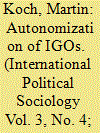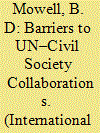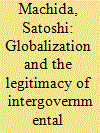| Srl | Item |
| 1 |
ID:
092300


|
|
|
|
|
| Publication |
2009.
|
| Summary/Abstract |
This article attempts to explain how international governmental organizations (IGOs) become autonomous. It argues for a conceptual shift to an organizational studies perspective that puts the concept of the organization at the center of attention. Although some approaches in IR already apply particular organizational theories, an open-system perspective offers a promising representation of IGOs, their internal dynamics, and external relations. Within an open-system perspective, modern system theory is useful for examining how autonomization processes can be explained by taking into account the momentum of self-referential closure on the basis of decisions.
|
|
|
|
|
|
|
|
|
|
|
|
|
|
|
|
| 2 |
ID:
183142


|
|
|
|
|
| Summary/Abstract |
In recent decades, civil society organizations (CSOs) have ostensibly attained increased access to the United Nations (UN) and other intergovernmental organizations (IGOs) and, in turn, increased opportunities for collaboration with IGOs. However, in most cases, CSO access to IGOs remains limited and highly regimented. Little scholarship has been undertaken to examine barriers to effective CSO–IGO collaborations. Virtually, no empirical research has examined the degree or nature of the interaction between the UN and international civil society via the dynamic of the flagship programme designed to facilitate such collaborations—the consultative status framework. This exploratory study partially addresses the latter gap in the scholarship by undertaking a qualitative macro-scale examination of CSOs within the UN Economic and Social Council’s (ECOSOC) consultative status programme, the primary vehicle in the UN–civil society dynamic. Specifically, the study sought to identify barriers to UN–civil society collaboration within the consultative status programme as perceived by participating CSOs. Findings of a survey sent to a random sample of 10% of CSOs holding UN–ECOSOC consultative status revealed that barriers to participation in the programme varied with some obstacles far more common than others. The degree of barriers reported by CSOs also strongly reflected the level of accreditation they held within the programme. Additionally, survey respondents offered insight as to how impediments in the collaboration could potentially be addressed.
|
|
|
|
|
|
|
|
|
|
|
|
|
|
|
|
| 3 |
ID:
103606


|
|
|
| 4 |
ID:
139527


|
|
|
|
|
| Summary/Abstract |
Do intergovernmental organizations (IGOs) screen out conflict-prone states? We argue that IGOs have incentives to guard against admitting new members that pose significant security risks. Using a data set based on state–IGO pairings, we find clear evidence of screening: As security risk increases, the probability of IGO membership declines. Our findings underscore the importance of accounting for possible selection bias when studying the effects of IGO membership on conflict. Indeed, the types of IGOs sometimes found to be most effective at promoting peace—namely highly institutionalized organizations and those with a security mandate—also prove particularly selective and sensitive to risk.
|
|
|
|
|
|
|
|
|
|
|
|
|
|
|
|